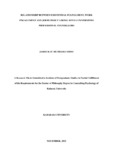| dc.description.abstract | Positive occupational health psychology research is rapidly taking centre stage in the field of work and wellness in the 21st century. However, three person-specific variables (existential fulfillment, work engagement and job burnout) have received little attention in studies among Kenya universities professional counsellors. The aim of the current study was to explore the relationship between existential fulfillment, work engagement and job burnout among Kenya universities professional counsellors. The study was guided by the following objectives: to establish the relationship between existential fulfillment and job burnout; to find out the relationship between work engagement and Job burnout; to investigate the contribution of existential fulfillment and work engagement to job burnout; to determine the influence of respondents‟ demographic characteristics (age, gender, experience, marital status, university category and level of education) on existential fulfillment, work engagement and job burnout among university professional counsellors in Kenya. The study was descriptive and utilized cross-sectional survey design that targeted population of 193 professional counsellors in 75 universities in Kenya. Saturated sampling techniques were used to conduct a census of the respondents. Data was obtained using the Existential Fulfillment Scale (EFS), Work Engagement Scale (UWES-17) and Maslach Burnout Inventory (MBI-HSS). Data collected was quantitative and descriptive statistics and inferential statistics were used in the analysis. All posited hypotheses were tested at 0.05 significant level and analysis done with aid of SPSS - 22. The response rate was 180 (94%). Existential fulfillment was moderate (EFS = 2.57; sd = 1.08); work engagement was high (UWES = 4.23; sd = 1.48) and job burnout was moderate (MBI = 2.2; sd = 1.77). Existential fulfillment was positively correlated with work engagement (0.173(p = 0.02˂0.05) and negatively correlated to job burnout (0.084(p=0.26˃0.05). Work engagement was negatively correlated to job burnout (0.327(p=0.0.00˂0.05). Based on these findings, it was recommended that Human Resource Departments should strengthen staff psychological support programmes to militate against job burnout and sustain the observed work engagement. These findings have significant implications for workplace psychological health and functioning. | en_US |

